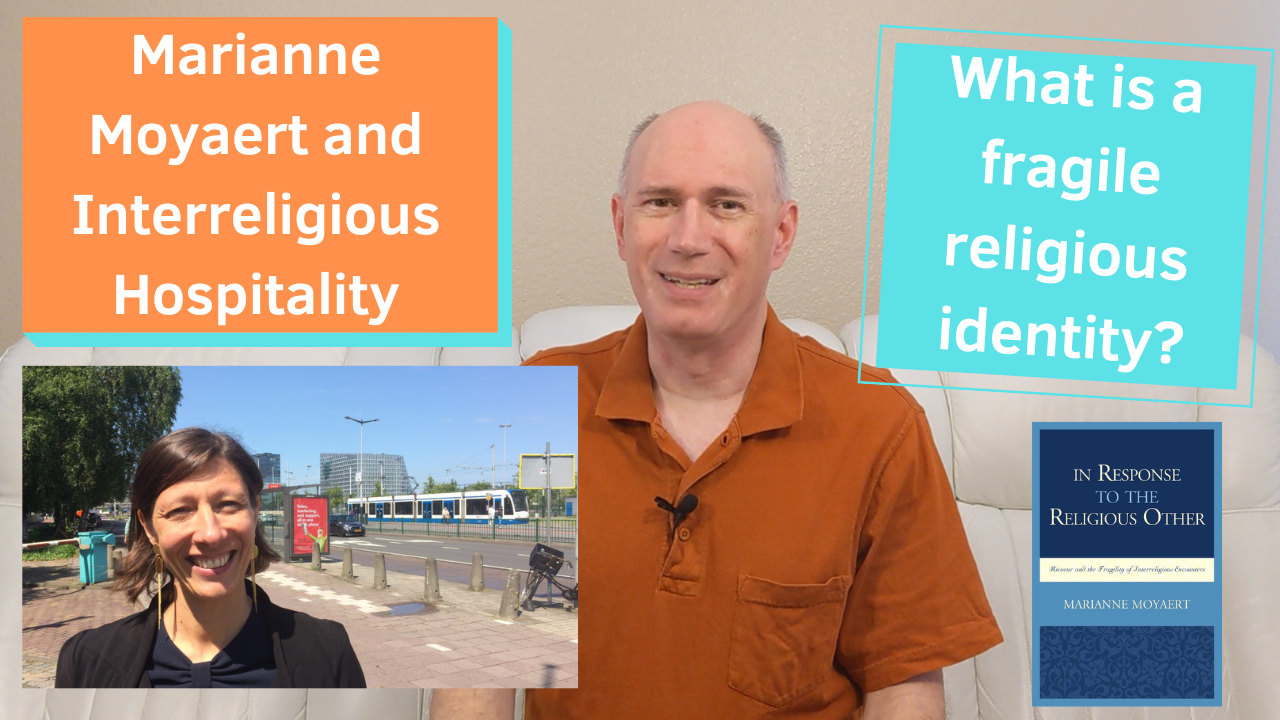04/12/2023 – Marianne Moyaert and Interreligious Hospitality

Why are we afraid of learning about other religions, especially if we have religious convictions? You’d think people who are strongly connected with a religious community would be more willing to learn about others, but that’s often not the case. I met a lady who wrote about a great response to address this issue. It’s called interreligious hospitality. Stick with us. This is TenOnReligion.
Hey peeps, it’s Dr. B. with TenOnReligion. If you like religion and philosophy content one thing I really need you to do is to smash that sub button because it really helps out the channel. The transcript is available at TenOnReligion.com and new episodes are posted about every two weeks, at noon, U.S. Pacific time, so drop me some views.
When I went to the American Academy of Religion Annual Meeting in Denver in November 2022, I met a European religion scholar I’ve wanted to meet for a long time named Marianne Moyaert. We had a short chat and I mentioned I’d like to do an episode or two about some of her views on this channel. So here we are. This episode is going to be on interreligious hospitality and the next episode is going to be on interrituality. This episode, much like the last one, is going to be influenced by Paul Ricoeur again because Marianne has done quite a bit of research on his writings. It’s based on her 2014 insightful book, In response to the religious other: Ricoeur and the fragility of interreligious encounters. Let’s get started.
In Paul Ricoeur’s famous book, Oneself as Another, he refers to the idea that the shortest route to learn about oneself is through the other. In religion this quickly becomes a problem because one has no access to the transcendent other than through one’s own religious tradition. This is the limit of what one can experience in their knowledge and relationship to the transcendent unless one engages more than one religious tradition. The transcendent, as a source of life, however, is also quite “other.” If one cannot deal with the otherness of the source of life one will also not be able to deal with the otherness of religious others, resulting in exclusivism. In such a scenario one wants to possess the source, make claims of absoluteness, and erect boundaries to protect it. A different way of looking at things is labeled as strange and this strangeness is perceived as a threat. One must then furiously defend against it because it is a contamination. What’s wrong with this scenario? The problem is, it turns a blind eye to the tension between the finite and the infinite. Strangeness should not be a threat, but an opportunity because the quest for meaning and truth is never-ending.
Now the alternative response, opening up oneself to another, can be a difficult path to follow because people might lose themselves before they can find themselves anew. What do we mean by that? When one’s identity, be it a personal identity or a community identity, feels threatened, there might be some resistance, or in many cases, a lot of resistance. But, think about this for a second. To many other people, we can be strangers. I mean, *we* don’t like to be dehumanized. Are we persons or things? To dehumanize someone is to make them into a thing. A thing is an answer to the question, what is it? What is this? It’s a shirt. This is a microphone. If a person, however, walks through the door we don’t often ask, what is it? We ask, who is she, or who is he? People and things are not the same. You and I and other people we meet have a narrative. This narrative represents a tension between permanence and change. Some of the permanence is pre-given, such as what country we’re born in or what languages and cultures we grew up in. At the same time, we have the freedom to make choices and thus are in a constant state of change. How does all of this figure into religion? I’m glad you asked that question. Okay, maybe you didn’t ask that question, but just pretend you did.
People develop deeply embedded convictions and for many, these can be religious. Such convictions are identity-defining, but it’s hard for a lot of us to realize that others have different ways of leading their lives. These strange ways can be perceived as a threat to our own identity because it unsettles what is familiar to us. This is what Moyaert refers to as a fragile religious identity. We long for wholeness and for this fragility to be healed. When we encounter someone who has completely unfamiliar ways we want to escape the discomforting effect this has upon us. One response is to go the route of xenophobia, which is the fear, rejection, and ultimately exclusion of strangers and their strange ways of living. But once we acknowledge we are also strange to them, we can open up our strangeness to them just as they can open up their strangeness to us. This mutual recognition is called hospitality. It is an acceptance and love of strangers which helps integrate our identity and otherness. Now that was some good stuff from my newfound buddy Marianne…well, we’re not actually buddies. I talked with her for like five minutes while browsing the book exhibit, but she was a cool lady. Anyway, check this out because we’re about to take this up to another level.
The interesting thing about religions is that they often change in response to the encounter with other religions. They’re not just monolithic blocks existing alongside one another, but are constantly in a process of negotiating different meanings. Faith communities which are completely closed and protective of their traditions from possible contamination from outsiders are pretty must lost to dialogue. But even those who are more open still have religious traditions which are connected to a story. The way we recount the story often has consequences for others because the narratives we tell often misrepresent others. The image of the other is constructed in such a way that is always inferior to oneself. If I can exclude or marginalize the other then my identity remains superior. The glorious moments in my religion’s history probably caused pain and suffering for someone else. Most people, and this especially includes religious adherents, have a really hard time being self-critical. How do we get around this?
In a word, this is exactly what hospitality means and that is what both Ricoeur and Moyaert are talking about. When we exchange stories, and this works even better when they are about similar events, our view of the account starts to change. When we welcome strangers and allow for multiple perspectives, our old view is liberated from its former rigid understanding. Hospitality is a reciprocal process as opposed to absorption, which is a unilateral process. Hospitality uses our imagination and induces us into a sense of sympathy for the story of the other which often challenges our views. There is much risk in the process because a loss of meaning is unavoidable. When we relate our narratives the other party might not fully understand just as when they relate their narratives we likely will not be able to fully understand. In that sense, we are incapable of offering perfect hospitality. But this loss of meaning is really a small price to pay for the opportunity to relate some level of meaning, and even more importantly, mutual recognition. We might even find ourselves again in the mix. As Ricoeur said, the shortest route to learn about oneself is through the other.
So, what do you think about interreligious hospitality? Can one risk one’s views by opening up and learning from the other? Leave a comment below and let me know what you think. In the upcoming episode we’ll be taking a look at a slightly different and practical take on interreligious understanding called interrituality. Until next time, stay curious. If you enjoyed this, support the channel in the link below, please like and share this video and subscribe to this channel. This is TenOnReligion.
Marianne Moyaert, In Response to the Religious Other: Ricoeur and the Fragility of Interreligious Encounters, (Lanham, MD: Lexington Books, 2014).


